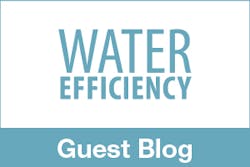By now you’ve likely heard about Bitcoin, the cryptocurrency that was briefly valued at nearly $20,000 in December 2017 before plunging to just $6,000 a couple months later. Cryptocurrencies can be difficult to understand and the concept behind them—blockchain—even more so. But since the applications of blockchain extend far beyond the nascent and volatile world of cryptocurrency and into the utility sector, it’s worth the effort.
Between rising sea levels and depleted aquifers reducing supply and a growing global population increasing demand, the world is facing a freshwater shortage. As demand rises and supply shrinks, new technologies will not only need to more efficiently reuse and recycle our water, but also ensure quality and fair access. This is where blockchain comes in.
You can’t throw a rock on the internet without hitting several articles trying to explain Bitcoin and blockchain. On the most basic level, blockchain is essentially a digital, decentralized ledger that records information and is secured through cryptography. The decentralized part is important—if there is no single record, it is much harder to implant false information. The cryptography is also important—it ensures that falsifying or modifying information after the fact is computationally infeasible. Essentially, instead of relying on a central authority (which may be corrupt or become corrupted and could easily modify past records) to provide an accurate history of transactions, blockchain relies on a decentralized list and codes that are mathematically impractical to crack.
But what does all this have to do with water utilities? Cryptocurrencies like Bitcoin and Etherium use blockchain to secure and track transactions, much like a bank would, but blockchain can be used as a secure record of any kind of information. For a water utility, that could include water treatment, historic price, quantity, and so on. Because blockchain is transparent and decentralized, using blockchain to track water quality, quantity, and even ownership would allow everyone (including customers, policy makers, and utility managers) to access the same information and make more informed decisions. Using blockchain could allow utilities to track water treatment and customer use, reduce overcharges, and limit NRW securely and transparently. One company, Genesis Research & Technology Group, hopes to use blockchain in conjunction with its own purification system to verify and track water quality after treating effluent from oil and gas production.
There are benefits to individual users as well. GreenBiz explains:
“Blockchain technology could also support peer-to-peer trading of water rights in a given basin, empowering water users who have enough or are willing to share their excess resources with others in the area to do so 24/7 without relying on a centralized authority. Imagine a scenario where farmers in the same water basin could make the decision to trade their allocations based on the latest weather data, crop prices, market trends, and longer-term climate trends—much of which is already accessible via their mobile devices.”
In that vein, an Australia-based startup called Civic Ledger is performing a feasibility study to see if a blockchain based micro-trading platform will allow residents in near Melbourne, Australia, to trade rainwater and reclaimed water.
Water isn’t the only utility with blockchain-backed applications: Brooklyn Microgrid aims to allow neighbors to generate and sell excess power instantly and securely with blockchain, and Power Ledger received $2.57 million AUD to fund a project running blockchain-based distributed energy and water systems in Fremantle, Australia.
Blockchain is still relatively new, especially to the mainstream, and we’re in the early days of non-cryptocurrency blockchain innovation. Whether or not blockchain catches on in the utility sector remains to be seen, but our increasing use of sensors and meters will require innovative security measures to protect the data we gather. Perhaps blockchain will be part of the answer.
What do you think about all this blockchain buzz? Do you see useful applications for blockchain in the water industry?

